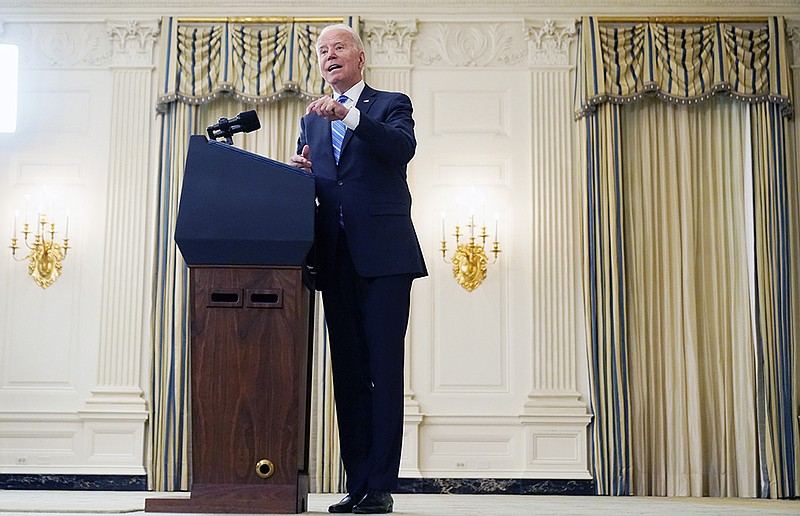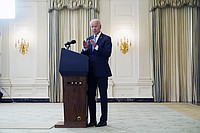President Joe Biden on Monday balanced his earlier criticism of Facebook by blaming bad actors on the website for spreading dangerous misinformation about the coronavirus and vaccines, but he still called on the company to be more aggressive in combating the problem.
The president said he hopes that "instead of taking it personally," Facebook spends more energy focusing on "the outrageous misinformation" on the social network.
Biden put Facebook on the defensive last week after accusing it of "killing people" by allowing the spread of misinformation about vaccines.
"They're killing people," Biden said Friday as he was departing the White House. "Look, the only pandemic we have is among the unvaccinated. And they're killing people."
Biden was asked to clarify those comments Monday after giving a speech about his infrastructure plan. The president said he'd recently read an article about how the majority of misinformation on Facebook came from a dozen individuals.
"Facebook isn't killing people, these 12 people are out there giving misinformation," Biden said. "Anyone listening to it is getting hurt by it. It's killing people. It's bad information."
Biden appeared to be referring to a study about a group of accounts called the "disinformation dozen," identified by the Center for Countering Digital Hate as spreading vaccine misinformation or hoaxes. Facebook previously said it has taken enforcement action against pages and accounts connected to these people in more than a dozen instances.
[Video not showing up above? Click here to watch » https://www.youtube.com/watch?v=kbDVRkI8Av8]
"We permanently ban Pages, Groups, and accounts that repeatedly break our rules on COVID misinformation, and this includes more than a dozen Pages, Groups, and accounts from some of the individuals referenced in the press briefing," Facebook spokeswoman Dani Lever said in a statement Monday.
Over the weekend, the company published a long blog post titled, "Moving Past the Finger Pointing," saying that vaccine acceptance has been rising on Facebook since January and defending itself against Biden's accusation.
Facebook has enacted policies to crack down on the misinformation. In December, it said it would ban false and misleading statements concerning vaccines. Since the beginning of the pandemic, the company said it has removed more than 18 million pieces of coronavirus-related misinformation.
But health misinformation still persists on the platform, and Facebook hasn't shared how many people have seen vaccine misinformation on its site. Critics of the company have called for greater transparency, and a coalition of liberal groups and individuals wrote to Facebook urging it to ban the accounts of the 12 people identified as persistent bad actors.
Social media companies, including Facebook, Twitter and YouTube, have long struggled to keep misinformation at bay. The companies employ thousands of content moderators to enforce their policies, but critics say they are often enforced unequally or too slowly. Pressuring the companies to do more to control the spread of misinformation has been a key point for Democrats in the increasing legislative crackdown against big tech.
White House press secretary Jen Psaki said Monday that while Biden wants Facebook executives to be more reflective about the role their company plays in misinformation, no decisions to get involved have been made.
"The administration isn't considering any regulatory or legal moves to possibly address disinformation on social media," she said in a briefing. "That's up to Congress to determine how they want to proceed moving forward."
"But let me just note that we are not in a war or a battle with Facebook," Psaki said. "We're in a battle with the virus and the problem we're seeing that our surgeon general elevated just last week is that disinformation traveling through a range of mediums. Some of them are a range of social media platforms."
INDIANA MANDATE
A federal judge has decided that Indiana University can require its roughly 90,000 students and 40,000 employees to get vaccinated in a ruling that might be the first of its kind regarding college immunization mandates.
In a ruling dated Sunday, U.S. District Judge Damon Leichty in South Bend rejected a request from eight students who sought to block the requirement while they pursue a lawsuit claiming the university's policy violates their constitutional rights by forcing them to receive unwanted medical treatment.
James Bopp, a conservative lawyer representing the students, said Monday that he plans to appeal the ruling, which he believes is the first by a federal judge in challenges to such mandates, which have been imposed by hundreds of U.S. public and private colleges.
Leichty wrote that the students haven't presented evidence showing they could prevail in the case, and that the Constitution "permits Indiana University to pursue a reasonable and due process of vaccination in the legitimate interest of public health for its students, faculty and staff."
Leichty said the plaintiffs could seek medical or religious exemptions offered by the university, or they could take the fall semester off or attend another school.
University officials defended the policy as one "designed for the health and well-being of our students, faculty and staff."
"We appreciate the quick and thorough ruling which allows us to focus on a full and safe return," the school said in a statement. "We look forward to welcoming everyone to our campuses for the fall semester."
Bopp said he would ask an appeals court to block the university's policy from taking effect.
"An admitted IU student's right to attend IU cannot be conditioned on the student waiving their rights to bodily integrity, bodily autonomy, and consent to medical treatment like IU has done here," he said.
Similar lawsuits have been filed in federal courts in Connecticut and California, Bopp said. College officials across the country have struggled with whether they have the authority to require student vaccinations, which some see as key to returning campus to in-person classes and other normal activities.
Indiana law also requires students at state residential colleges and universities to get immunized for diphtheria, tetanus, measles, mumps, rubella and meningitis. Students in public K-12 schools are required to get vaccinated for an additional five diseases.
The plaintiffs in the lawsuit, who range from 18 to 39, maintain that their age group is at low risk of severe cases of covid-19 and that they face possible dangers from the vaccine that is being administered under federal emergency-use authorization.
Leichty, who became a federal judge in 2019 after his nomination by then-President Donald Trump, faulted a doctor who testified against IU's policy for using "soft and inconsequential language" and cited the extensive review by federal health agencies to confirm the safety of the three available vaccines.
"Progress has been made because of the vaccine, not despite it," Leichty wrote. "To the extent that lingering medical and scientific debate remain ... the court remains resolved that Indiana University has acted reasonably here in pursuing public health and safety for its campus communities."
SW MISSOURI DRIVE
With the delta variant causing a surge of new covid-19 cases and hospitalizations in southwestern Missouri, health officials have taken to going door-to-door in an effort to encourage vaccinations.
The Kansas City Star recently followed along as health officials knocked on doors in Springfield, handing out brochures. The effort was nonconfrontational and the officials always took "no" for an answer, the newspaper reported, despite concerns raised by Gov. Mike Parson and other Republican leaders that the outreach would be heavy-handed.
Southwestern Missouri has seen an alarming rise in illnesses in recent weeks. There was a tinge of good news Monday: The number of people hospitalized dipped slightly both in southwestern Missouri and across the state, according to Missouri Department of Health and Senior Services data.
After several days of more than 1,000 newly confirmed cases, the state reported 826 on Monday, bringing the total to 545,551. No new deaths were reported, keeping the total at 9,474.
Southwestern Missouri lags well behind the national average for vaccinations, but persuading more people to get shots is proving difficult.
In Springfield, Annaliese Schroeder, a community health advocate, knocked on a door and briefly talked about an upcoming clinic. She offered a door tag with information about the virus, and asked a few questions: Do you want information about the clinic? Do you know someone who does? Do you have any questions about other clinics, or the vaccines?
Josh Gollaher and Nikki Schaub turned down a flyer as they walked home to their apartment complex. Both told a reporter they were adamantly against taking a vaccine.
"I just don't want to," said Schaub, 42. "I'd rather wear a mask."
Gollaher, 29, said he doesn't trust the studies about the virus's spread.
"Their studies could be wrong," he said. "It'll blow over."
Schroeder and Kelsey Connor, a public health information specialist, said those sort of encounters are rare. They said they are careful not to push back when residents turn them down, and they never ask a person's vaccination status.
"If somebody is already a little uncertain, being aggressive ... is not something that's going to make them feel more comfortable to come in and get vaccinated," Schroeder said. "It's a lot about creating that community bond ... so when they see us they don't feel unsafe or threatened."
MISSISSIPPI'S 4TH WAVE
Mississippi's top public health official said Monday that the state is seeing a rapid increase in cases this month.
"4th wave is here," Dr. Thomas Dobbs, the state health officer, wrote on Twitter.
The Mississippi Department of Health said 2,326 new cases of covid-19 were confirmed Friday through Sunday. That's the largest three-day increase since February.
As of Monday, the Health Department said Mississippi has had 329,130 confirmed cases and that 7,468 people had died.
Democratic state Rep. Jeramey Anderson of Moss Point posted the Health Department numbers on Twitter, and wrote: "Consequences of not getting vaccinated and poor mask wearing. Well Mississippi -- you wanted it here it is. This is ridiculous and the deaths that will definitely follow were completely avoidable."
Mississippi has one of the lowest vaccination rates in the nation, and the surge is happening as schools prepare for the new academic year. Classes begin July 26 in the northern Mississippi city of Corinth and in early to mid-August in most other districts.
The state Board of Education has adopted policies requiring all school districts to restart in-person learning as the main form of instruction.
DISPUTE OVER CRUISES
In Florida, Gov. Ron DeSantis promised Monday to go as high as the U.S. Supreme Court to ensure that a federal health agency has no authority over the cruise industry, which is trying to resume voyages after an extended shutdown.
The governor said the state would seek to reverse an order issued late Saturday by the U.S. Court of Appeals for the 11th Circuit in Atlanta that prevented the lifting of restrictions imposed in spring 2020 by the Centers for Disease Control and Prevention.
At DeSantis' direction, Florida sued the CDC in April, saying its cruise ban was harming Florida's economy and was illegal because Congress never granted the CDC authority to impose health and safety rules on cruise ships operating from U.S. ports.
In June, U.S. District Judge Steven Merryday granted the state a preliminary injunction that would have stripped the CDC's authority. The CDC appealed the injunction, which was set to take effect Sunday.
But Saturday night, a three-judge appellate court panel in a 2-1 vote granted the CDC's request to delay the injunction as the case moves forward.
DeSantis on Monday said he was confident that the full 12-member appellate court or even the Supreme Court would side with the state and reimpose the injunction sidelining the CDC.
Information for this article was contributed by Eugene Scott and Rachel Lerman of The Washington Post; by Tom Davies, Emily Wagster Pettus and additional staff members of The Associated Press; and by Ron Hurtibise of the South Florida Sun Sentinel (TNS).

